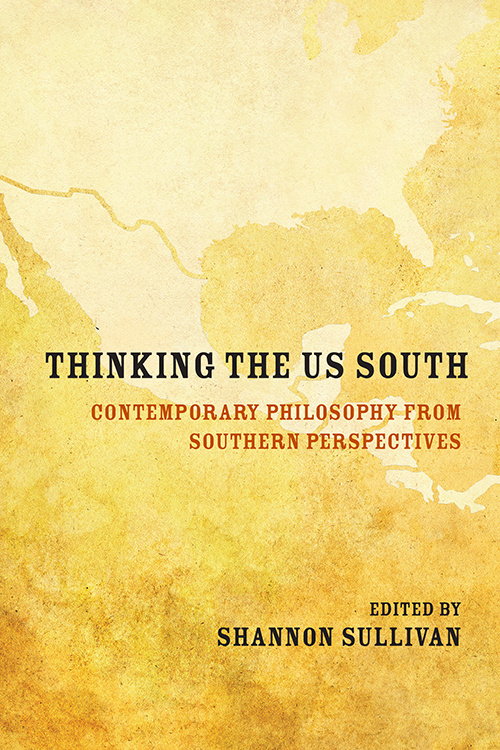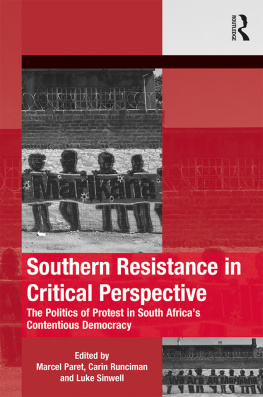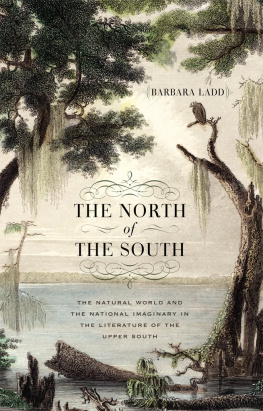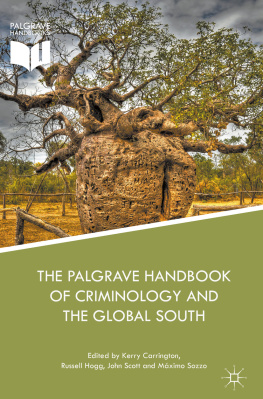
Thinking the US South
Thinking the US South
Contemporary Philosophy from Southern Perspectives
Edited by Shannon Sullivan

NORTHWESTERN UNIVERSITY PRESS
EVANSTON, ILLINOIS
Northwestern University Press
https://www.nupress.northwestern.edu
Copyright 2021 by Northwestern University Press. Published 2021. All rights reserved.
Library of Congress Cataloging-in-Publication Data
Names: Sullivan, Shannon, 1967editor.
Title: Thinking the US South : contemporary philosophy from Southern perspectives / edited by Shannon Sullivan.
Description: Evanston, Illinois : Northwestern University Press, 2021. | Includes bibliographical references.
Identifiers: LCCN 2020041823 | ISBN 9780810143302 (paperback) | ISBN 9780810143319 (cloth) | ISBN 9780810143326 (ebook)
Subjects: LCSH: PhilosophySouthern States. | Philosophy, American. | Southern StatesIntellectual life21st century.
Classification: LCC B946 .T45 2021 | DDC 191dc23
LC record available at https://lccn.loc.gov/2020041823
A note to the reader: This e-book has been produced to offer maximum consistency across all supported e-readers. However, e-reading technologies vary, and text display can also change dramatically depending on user choices. Therefore, you occasionally may encounter small discrepancies from the print edition, especially with respect to indents, fonts, symbols, and line breaks. Furthermore, some features of the print edition, such as photographs, may be missing due to permissions restrictions.
C ONTENTS
Shannon Sullivan
Linda Martn Alcoff
Ladelle McWhorter
Arnold L. Farr
Michael J. Monahan
Shiloh Whitney
Mariana Ortega
Lindsey Stewart
Devonya N. Havis
Shannon Sullivan
Kim Q. Hall
Lucius T. Outlaw (Jr.)
My thanks go to Trevor Perri, senior acquisitions editor, and two anonymous reviewers for Northwestern University Press for their support of this book and helpful suggestions during the revision process. I also appreciate the copyediting and formatting assistance that maggie castor provided as the manuscript was being prepared for review. Finally, I warmly thank the authors of the books chapters and afterword, who took up my invitation to think critically and creatively about the South. I appreciate their hard work and their willingness to take some philosophical and existential risks as they wrote their essays.
Chapter 1, The Southern White Worker Question, includes material adapted with permission from pages 196 to 203 of Linda Martn Alcoffs The Future of Whiteness (Cambridge, UK: Polity Press, 2015). Chapter 9, Dumping on Southern White Trash: Etiquette and Abjection, has been adapted with permission from pages 25 to 39 of Shannon Sullivans Good White People: The Problem with Middle-Class White Anti-Racism (Albany: SUNY, 2014).
This book is dedicated to my daughters, Samantha and Sophia, whom I love dearly, and to Jennifer, Michele, Julia, Maya, Gordon, Lisa, Ben, Joanne, Ruth, Emily, Erika, and my parents, Alex George and Bettye, for being there for me and helping me through hard times.
Doing Philosophy from Southern Standpoints
Shannon Sullivan
What might it mean to do philosophy from Southern standpointsand why would anyone want to do that? As many feminist, critical race, existential, phenomenological, pragmatist, and other philosophers have argued, knowledge is situated. It emerges out of contexts and practices that often are shaped by gender, race, class, sexuality, religion, and a number of other salient axes of lived experience. There is no placeless, timeless location from which to know the world. There is no generic, Gods-eye point of view for human beings to occupy. Given this fact, do regional differences within the United States make a difference philosophically? If so, how? Put another way, if place matters, how does this placethe US Southmatter?
This goal of this collection is to explore these questions, using the US South (aka, the South) as an intersectional site for philosophical inquiry. The books main thesis is that regional location and regional identities in the United States play an important role in epistemological, ethical, political, emotional, affective, ontological, and related matters. And yet, the philosophical significance of the South has largely been neglected or ignored. Some exceptions include feminist philosophy in which the South shows up peripherally as the authors examine issues of race. I am thinking, for example, of Linda Martn Alcoffs childhood in Florida as the daughter of a Panamanian father, Kim Q. Halls experience of the Confederate flag growing up in a white Virginian family, and Ladelle McWhorters love of her boots when she went line dancing in Virginia. All this led me to wonder: what might a situated philosophy look like if its rootedness in the South was self-consciously central, rather than marginal to its significance? The ten chapters and afterword in this book are a beginning of an answer to that question.
But why the South in particular? I chose the South not only because I am a Southerner (of sorts: a Texan), but also because the South is not merely one region among others. In fact, in attempting simply to pinpoint it geographically, we already can see how the South as a productive concept is at play. Is the South the eleven states that seceded to form the Confederate States of America? No, because that would omit Southern states such as Kentucky and West Virginia. It also would include Texas, which is in the Southwest rather than in the South proper. (Texas was part of the Confederacy, an oft-forgotten fact.) Is the South all states below the Mason-Dixon line? Not exactly, because that would include Florida, which is geographically south but culturally different than the South even though it also joined the Confederate States of America. (Like Texas, Florida has a particularly complicated relationship with the South.) The point here, as with the book as a whole, is not to try to define the necessary and sufficient conditions for being part of the South but to illuminate some of the generative results of using the South for philosophical thinking.
The South is not solely a geographical location. It also is an idea. Sometimes it is a fantasy; other times, it is a nightmare. In any case, it is a prominent component of the US national imaginary. Witness the South as a nagging reminder of, if not an outright synonym for, chattel slavery and the Civil War (the Old South); as a marker of stupidity and backwardness (rednecks and white trash); as a symbol of progress (the New South); as a national embarrassment and even a literal joke (You can tell a Southern virgin when you see a girl running faster than her father and brothers); and above all, as a dumping ground for allegedly being solely responsible (guilt) for racism and white supremacy in the United States. The South also is a site of tremendous regional pride (Some are born Southern; others just wish they were), although whether that pride is a shameful sign of the incorrigible racism of the South tends to depend on whether you ask a Southerner or a Northerner.
Consider the controversial topic of the Confederate flag. The historical record is clear: the flag that today is the Confederate flag was not the flag flown by the Confederate States of America during the Civil War. It was a battle flag flown by Robert E. Lees Virginia troops that became associated with the Confederacy many years
Next page









